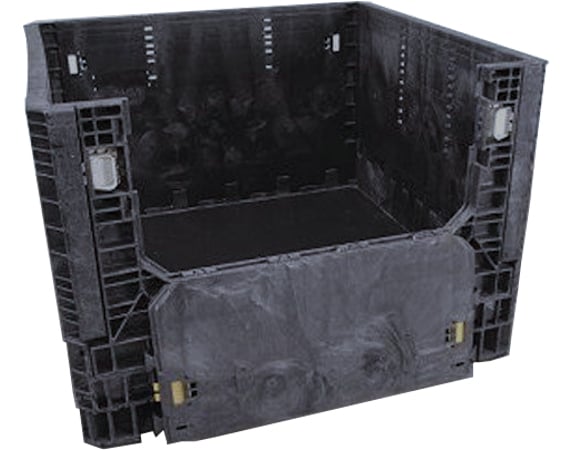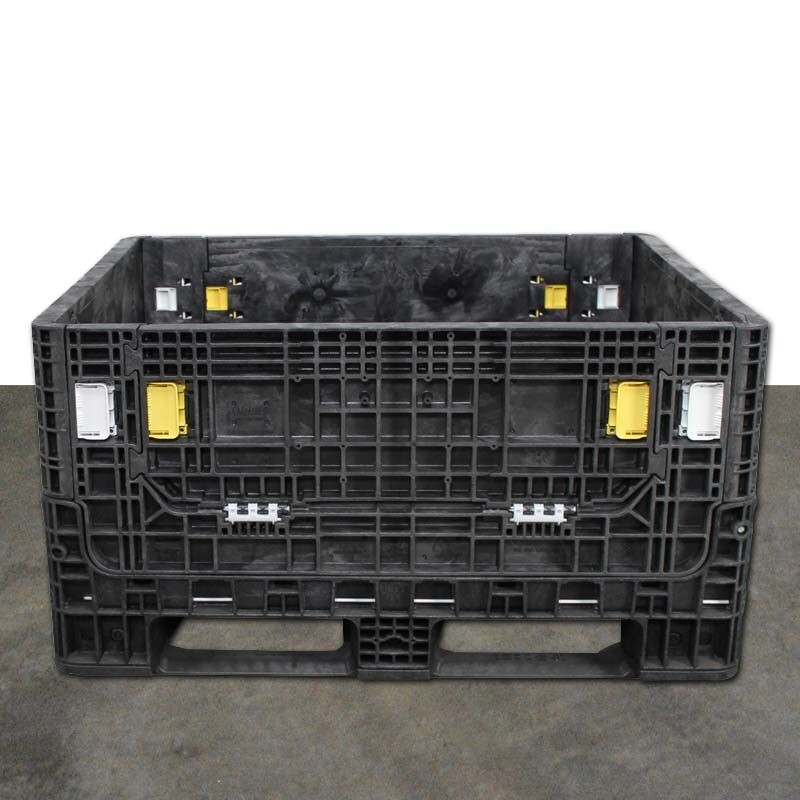Exactly How Mass Containers Can Improve Efficiency in Your Product Packaging Procedures
Mass containers play an essential duty in enhancing packaging operations. Their style allows better use upright room and promotes arranged inventory monitoring. This effectiveness results in minimized product replenishment regularity and reduced labor expenses. Furthermore, the longevity of these containers lessens product damage. As companies seek means to enhance their procedures, understanding the multifaceted advantages of bulk containers comes to be important. What other advantages might they offer the table?
Structured Storage Solutions
As business seek to enhance their procedures, structured storage solutions have actually ended up being important for improving packaging effectiveness. Effective storage not just saves space but also assists in quicker access to materials, which is crucial in fast-paced production atmospheres. Mass containers, designed for simple piling and organization, significantly lower the complexity of storage systems. They permit companies to maximize upright room while decreasing the impact required for stock.
In addition, these containers usually feature ergonomic designs that simplify dealing with and transport, reducing the danger of injury and improving process. By settling materials wholesale containers, companies can decrease the frequency of restocking and streamline their supply chain procedures. Overall, the application of reliable storage space services promotes a much more well organized workspace, causing raised performance and lowered functional costs. With thoughtful design and calculated use bulk containers, companies can attain significant improvements in their packaging procedures.

Waste Reduction and Sustainability
While the search of efficiency commonly drives product packaging decisions, waste decrease and sustainability have actually become important considerations in contemporary procedures. Business progressively identify that adopting mass containers can greatly reduce material waste. These containers frequently use less packaging product than standard approaches, leading to a smaller carbon impact.
Bulk containers can be reused multiple times, which even more decreases the demand for single-use product packaging and reduces general waste entering landfills. Their design commonly enables much easier recycling procedures, lining up with sustainability goals.
Additionally, companies that focus on waste decrease can improve their brand online reputation, appealing to environmentally conscious customers. By implementing mass containers, services not only streamline operations however also add favorably to ecological stewardship. This double benefit of functional effectiveness and sustainability positions firms positively in an open market progressively concentrated on environment-friendly practices.
Improved Assembly Line Performance

Carrying out mass containers on production line significantly improves efficiency by streamlining the handling and transport of products. By making use of bulk containers, manufacturers can lower the regularity of product replenishment, permitting workers to concentrate on setting up tasks instead of constant supply management. This brings about fewer interruptions and a smoother process, eventually enhancing efficiency.
In addition, mass containers are designed for very easy assimilation with automated systems, even more optimizing the assembly process. Their standardized shapes and sizes Source promote better organization, making it possible for workers to situate and gain access to products quickly. This reduction in search time adds to an extra fluid manufacturing environment.

Price Cost Savings and Improved Revenue Margins
Notable expense financial savings can be recognized through the fostering of bulk containers in product packaging processes. By reducing the requirement for numerous smaller sized plans, image source firms can decrease material prices significantly. Bulk containers often call for less product packaging product on the whole, causing lower expenses on materials. Additionally, the efficiency of bulk handling lessens labor prices associated with packing and unpacking, better boosting savings.
Less journeys to distributors and lowered transport expenses are also crucial benefits, as bulk containers allow for increased item capability per delivery. This higher quantity not just minimizes shipping expenditures yet also enhances storage space within centers, resulting in improved stock monitoring.
The sturdiness of bulk containers commonly converts to lower damages prices during handling and transportation, protecting item integrity and minimizing waste. Collectively, these variables contribute to better earnings margins, making bulk containers an economically helpful option for organizations seeking effectiveness in their packaging operations.
Flexibility Across Industries
Bulk containers provide remarkable convenience throughout different markets, making them a useful possession beyond simply set you back savings. In the food and beverage field, these containers assist in the safe transportation and storage space of big quantities of active ingredients, boosting efficiency in assembly line. In drugs, mass containers ensure compliance with stringent health criteria while accommodating the bulk handling of raw products. The chemical market additionally benefits, as these containers endure severe compounds and prevent contamination, sustaining safe operations. used plastic containers. In addition, the agricultural field utilizes mass containers for moving grains and fertilizers, decreasing and maximizing logistics waste. Their versatility reaches production, where mass containers streamline setting up processes and decrease the demand for excessive packaging. This cross-industry functionality not only boosts functional performance yet likewise promotes sustainability via reduced packaging waste, illustrating the integral role bulk containers play in modern-day supply chains
Frequently Asked Concerns
Exactly How Do Bulk Containers Impact Employee Security in Product Packaging Procedures?
Bulk containers greatly boost staff member safety in product packaging procedures by minimizing hand-operated handling, minimizing injury risks, and advertising ergonomic practices. Their design facilitates much safer transport and storage, eventually developing a more secure workplace click for more for all staff members.
What Materials Are Bulk Containers Generally Made From?
Mass containers are commonly made from sturdy materials such as high-density polyethylene, wood, polypropylene, or metal - used plastic containers. These products provide stamina, resistance to ecological factors, and viability for different contents, ensuring reliable and risk-free transport of goods
Can Mass Containers Be Personalized for Details Products?
Yes, bulk containers can be personalized for certain products. Producers frequently tailor measurements, products, and includes to meet unique needs, making sure optimal security and performance throughout storage and transportation of different items.
Just How Do Bulk Containers Affect Transport Logistics?
Mass containers simplify transportation logistics by maximizing freight space, lowering the variety of trips needed, and reducing dealing with expenses (used collapsible containers). Their standardized dimensions promote reliable loading and unloading, eventually leading to enhanced operational effectiveness throughout the supply chain
What Is the Lifespan of Bulk Containers in Normal Usage?
The lifespan of mass containers in normal use commonly varies from 5 to ten years, depending on worldly top quality, handling methods, and ecological problems. Correct maintenance can considerably prolong their usability and efficiency.
Applying mass containers on setting up lines substantially improves effectiveness by simplifying the handling and transportation of products. Mass containers frequently call for less packaging product in general, resulting in reduced expenses on supplies. In drugs, bulk containers assure conformity with rigorous health standards while suiting the bulk handling of raw materials. Their adaptability prolongs to manufacturing, where mass containers simplify setting up processes and reduce the demand for excessive packaging. Bulk containers significantly enhance worker safety in packaging operations by reducing hand-operated handling, lessening injury dangers, and promoting ergonomic practices.